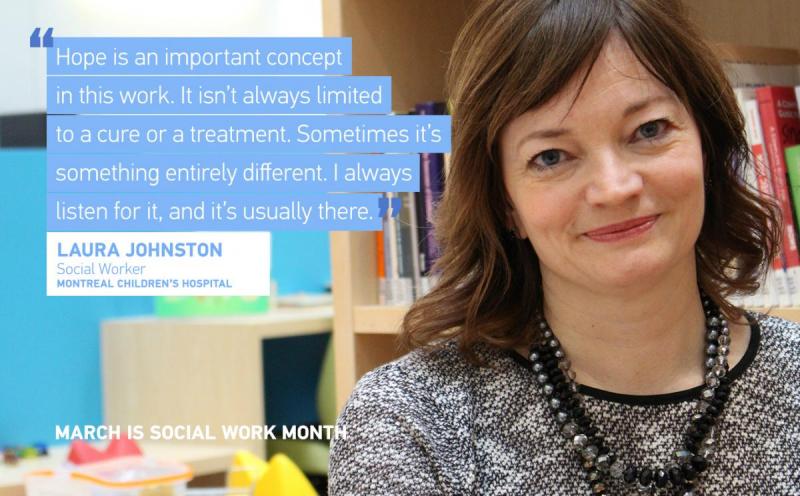Restoring Hope: The power of social work
March is National Social Work Month
At the Children’s, our social workers are committed to supporting the well-being of our patients and their families. Their role is to assess patients’ psychosocial needs to get a better understanding of their overall health. They work with families, multidisciplinary teams and community partners to mobilize resources to assist the patient in achieving goals, both big and small. Join us in thanking all of our social workers for the amazing work they do to support our patients, families and fellow health professionals day in and day out.

Laura Johnston has worked at the Montreal Children’s Hospital since 2001, and for the past 5 years has been with the Neurosurgery and Hematology/Oncology teams providing support to families facing acute or chronic illnesses. “My work is primarily with children who are being treated for brain tumours, or who have sickle cell anemia,” she explains. “We support patients and families at diagnosis, a time of crisis for the whole family, and throughout their treatment. We can help provide strategies for parenting a sick child, facilitate communication between the family and their health care team, assist with financial challenges, and link people with hospital, community, and governmental resources to support them.”
Laura says she developed an interest in working with children and families early on in her social work career. Her interest in healthcare is something that seems to run in her family, with three generations of nurses. Her work at the Children’s is both a challenge and a source of inspiration, she explains. “I really like the interdisciplinary nature of pediatric social work. On any given day I work with multiple specialties to help families find solutions to their unique and often difficult situations.”
When asked about the most rewarding part of her work, Laura is quick to reply. “I am always touched by the bravery I see in patients and their families. I often meet them at such a vulnerable time; it’s incredible to witness how resilient people can be.”

Sue Mylonopoulos says she was always drawn to working with teens, and a career in social work has been a great way to blend her interest in humanitarianism, mental health and pediatrics. Since late 2001, Sue has guided and counseled patients and their families in the Eating Disorders Program at the Montreal Children's Hospital, conducting psychosocial assessments and leading family-based interventions.
“Eating Disorders can have complex, multilayered manifestations. My goal is to get a comprehensive understanding of a patient's strengths, cultural, social and school background, family dynamics, key stressors, past as well as current health concerns in order to guide therapeutic interventions.”
Given that Eating Disorders are acute and potentially chronic illnesses, Sue explains that working with patients who are diagnosed with Anorexia Nervosa can be challenging. “I support families who are dealing with one of the most distressing periods of their lives. To help empower and mobilize the teen and family to achieve their goals, and to move beyond being hostage to this illness, however, is very rewarding.”
“I believe in the human capacity for change and growth and most notably the strength and resiliency of children and youth- even in the most difficult circumstances,” says Sue. “It’s most fulfilling when I am able to help a teen and their family find internal and external resources to improve their well-being and to bear witness to them re-establishing a sense of hope and normalcy in their lives.”


